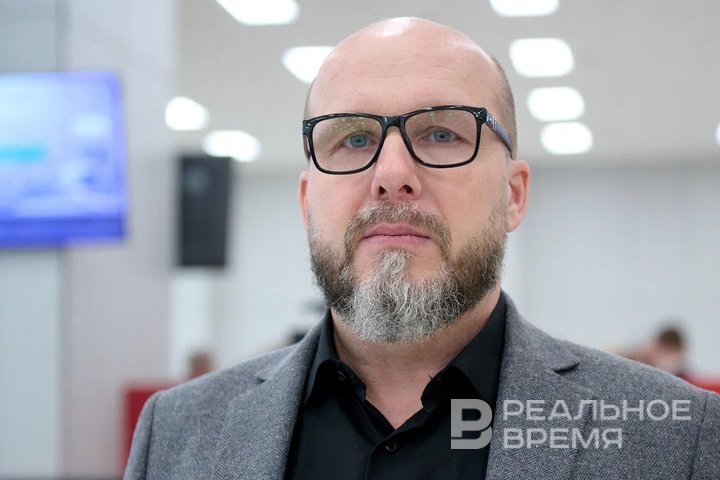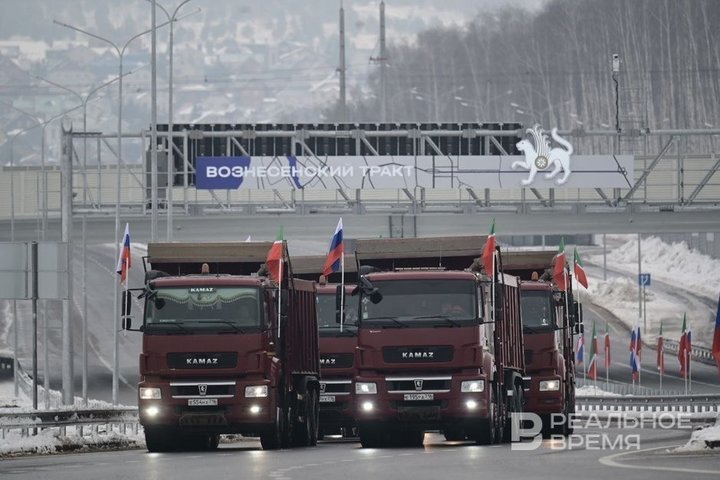Sergey Sotnikov: ‘Reorientation from Western trucks to Chinese is a global mistake’
The head of the Committee of the Chamber of Commerce and Industry of the Republic of Tatarstan on Logistics and Road Transportation — on problems and innovations in the industry

This year, the transportation market is set for significant changes: starting from March 1, Russia plans to introduce a unified registry of freight carriers. It will include information about the company, cars, transported goods and other information. Inclusion in the list is a prerequisite for the operation of transport companies. The registry will include only those legal entities and sole proprietors who meet the qualification requirements. Besides, the experiment on digitisation of all cargo transportation in Russia on the basis of the National Digital Transport and Logistics Platform will continue. In an interview with Realnoe Vremya, Sergey Sotnikov, the head of the Committee of the Chamber of Commerce and Industry of the Republic of Tatarstan on Logistics and Road Transportation, director of Revers transportion company, told how these innovations were perceived in the professional community and what problems Tatarstan carriers will have to solve in the coming year.
“I don't even want to predict what will happen”
Mr Sotnikov, what results did the carriers achieve by the end of the year?
At the beginning of 2024, everything was more or less stable. I think it was the inertia of 2022-2023. However, autumn offset this rise at the beginning of the year. It has become more difficult to find cargo. Although autumn had always been considered one of the most profitable periods. But last year the situation changed. We see that the cost of transportation is decreasing. And transportation prices start to fall, precisely when there are few goods. Depending on the direction and type of cargo, the drop is approximately 10-15%. Downtime while waiting for cargo has also increased. If it was so bad in the best period of the year, then I don't even want to predict what will happen now.
I think this is due to that there have been drastic changes in the economy. I assume that when money was poured into certain industries in 2022-2023, such as construction, agriculture and others, the Mishustin government provided a lot of support measures, this directly or indirectly affected everyone. And our prices for transportation were growing very rapidly, there was a shortage of transport, and there was a shortage of drivers. And since the spring of last year, when the Central Bank began to raise the refinancing rate, everything began to change. For example, our construction-related clients have reduced their construction volumes, and we have reduced our transportation volumes accordingly. In addition, leasing companies have begun to raise their tariffs, as they are tightly linked to the refinancing rate.

The cost of equipment has increased significantly. But despite this, there was still a lot of demand for trucks last year. People bought a lot of equipment and now can't keep up with the payments. There are already many facts when leasing companies take equipment back. I think we will face a wave of carrier bankruptcies. It's going to be hard for those who have risky loans. Plus, in order to somehow hold out, they start dumping and lowering prices. But the race “who will go cheaper” doesn't do anything good either. Plus, the unstable dollar exchange rate, the cost of spare parts has become higher, and fuel is also getting more expensive. Therefore, our expenditure part is increasing, and the revenue part is decreasing.
“KAMAZ turned out to be slow-acting”
Which of the Tatarstan carriers is in danger of bankruptcy?
Unfortunately, there is no section in Rosstat where you can go and see the whole picture, and this is the number one problem from the point of view of analytics and forecasting. There is no good source data. But working in this system, constantly communicating with colleagues, as they say, we feel the situation with our fingertips and understand who is in pain and what difficulties arise.
Currently, leasing companies are overwhelmed with the equipment they select. This process has been going on for several months and is growing more and more. Besides, now they practically don't buy equipment. In addition, people have been delayed with payments.
Today, the average age of a fleet of cars is almost 20 years old. It doesn't come from a good life either. Still, it's wrong to run a business on too old equipment, but you can't buy new one. And this affects, among other things, road safety. The lack of good incomes leads to that people start saving on maintenance of equipment. And this again has a negative impact on security.
Every second passenger car sold in Russia is Chinese. Is there a similar trend in cargo transportation?
Yes, absolutely. When the demand for transportation grew strongly, people were forced to buy Chinese cars. Because Western companies left Russia, and KAMAZ turned out to be slow-acting, unable to meet the needs of the business. I think their policy is short-sighted. It was immediately clear that the demand for vehicles, including KAMAZ, would increase. And the government was ready to help our producers at that moment. It was necessary to dramatically increase the production of truck tractors and, in general, trucks of domestic production. But KAMAZ, as I understand it, continues to rely on government contracts, considering the needs of the commercial market less significant. At the time when the equipment was needed, there were few KAMAZ trucks and at an uncompetitive price. It turned out that a Chinese truck was easier to buy than a KAMAZ. The difference is decent. And now nobody needs the trucks. A spoon is dear when lunch time is near.

China got its bearings very quickly. They organised the delivery and sale here. As a result, a lot of Chinese trucks were bought. We understood that this equipment was not of European quality, but something in between KAMAZ and European trucks. We don't know what will happen next yet. Whether China will improve in terms of quality is debatable.
My personal opinion: the fact that we have moved from one dependence to another, our reorientation from Western trucks to Chinese trucks, is a global mistake.
“It's easier to paste a nameplate”
What should I have done?
You see, we buy Chinese trucks, and this money goes to Chinese manufacturers. They are developing and expanding there. What about us? We have KAMAZ. What else? There is practically nothing else. We have been saying for many years that we need domestic technology. The money should remain inside the country, for the development of our own production.

There should be a reasonable strategic policy in terms of providing own equipment. At one time, when KAMAZ was being built in the 70s, far-sighted people realised that we needed our own production. It should be the same story now. And we have a free market. Whoever wants to is here and sells. The only barrier is an increase in the recycling fee, which led to an increase in the cost of Chinese trucks and others automatically joined them, the same KAMAZ, which is growing in price without hesitation. There were times when we bought them for three million. They cost eight million now. The equipment is expensive, not everyone can afford it. That's why we drive old foreign cars and buy spare parts abroad using foreign currency. We buy Chinese with foreign currency. These are huge sums. There is another side: the same KAMAZ or other domestic equipment is produced using imported components. Apparently, it is difficult to establish the production of complex technological equipment, it is easier to buy abroad, bring it here, assemble and paste the “Made in Russia” nameplate here.
It turns out that the rapid activity in terms of import substitution remains only in words?
We have been chasing imitation activities for many years now. We need to solve the problem quickly and promptly. By issuing an order and resolution, everything should be fine in 2-3 months. But this is a long-term systematic work, it requires serious decisions. And those who quickly want to report that the job is done are not interested. That's why we see this gluing of nameplates, as with the Moskvich car. No one is responsible for any of this.
I would like to see such projects appear, the scale of which would then stretch the entire economy, including us. For example, the construction of an automobile plant, like KAMAZ.

I'm not in favour of investing money in highways, because roads don't generate anything. The road is built, and it's all over. The amount of transport, cargo, and people that was, remains the same. But when building a factory, for example, for the production of bearings, computers, and televisions, money is invested, and then it constantly produces and generates something new.
In general, something bigger is needed. But not PR, when they throw dust in their eyes, and not holding forums, seminars, etc. We are very fond of pompous events. We are tired of PR. I wish there were more practical things.
“Everyone and no one is responsible”
In what direction is your logistics and trucking committee currently working?
We continue to make suggestions. Now we are concerned about the changes that they want to introduce into the industry. The innovation that they want to adopt this year is the register of carriers. There are some concerns about how this will affect companies. It may turn out that not everyone will be able to get into it, so this may become a limitation for entrepreneurs. It is also planned to start digitising all processes. Digitalists, of course, tell us that it will be good and convenient for everyone. But we have concerns, no matter how we become hostages of disconnected computers.
We are concerned about transport issues. There should be provision of spare parts. Who should regulate it? The market? Now it regulates everything in such a way that we buy everything abroad. We have the ministry of roads and transport. Maybe they should also remember that there is a transport industry and take it up. We need to understand what problems we have. To lobby them at the state level and solve them. For now, all we see is the ribbon-cutting — the opening of new highways here and there.

We are concerned about the personnel issue. I believe that it should be solved systematically. It is not enough to simply force all students to work for three years at the enterprise after graduation. This is an imitation way of solving the problem in a quick way. It is more important to raise the prestige of the profession, establish a system of vocational schools, analyse the professions that are needed, and how to teach these professions.
There is a lack of high-quality specialisation now. There aren't enough techies. Those who can understand technology. It is necessary to invest in people, to educate from childhood, to cherish them. We need to raise qualified engineering staff in some way, and this is difficult. There is no responsible person. Everyone and no one is responsible.
We are concerned about the issue of labour market regulation. Today, one of the most popular professions is courier, which, with a minimum of knowledge, provides a good salary. There is an outflow of young people, and these people need to be directed in the right direction. It may even be worth limiting the work of couriers to additional taxes. How to make young people want to become engineers, aircraft builders, etc. It is definitely impossible to solve this problem with the help of slogans.